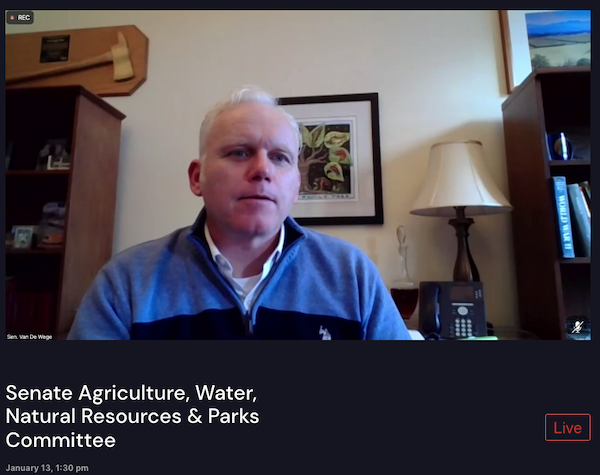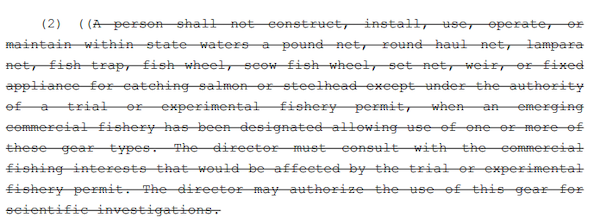Bill To Relegalize Commercial Pound Nets, Fish Wheels Heard
Commercial salmon and steelhead fishing gear that has been banned for nearly 90 years in Washington could be legalized under a bill that had a public hearing today.
SB 5567 would remove restrictions on using pound nets, fish wheels and other fixed equipment that voters, concerned with fish overharvest, outlawed in a 1934 initiative by a nearly two-to-one margin.

The bill was introduced by Sen. Kevin Van De Wege, a Sequim Democrat, who prefaced it by saying that if the devices hadn’t been done away with, they would have led to the extinction of salmon on the Columbia and elsewhere, such was their effectiveness, but said his bill will re-allow gear that had been shown to fish selectively.
For the past few years the Wild Fish Conservancy has been operating a pound net station on the Lower Columbia near Cathlamet on an experimental basis and its backers’ touts today included reduced wild salmon handling and providing managers with options for holding fisheries over ESA-constrained stocks that swim alongside more robust harvestable ones.
A number of university researchers expressed support for the bill, as did Seattle restaurateur Renee Erickson, who said that finding sustainable salmon from Washington for her tables was a mission of hers.
Speaking through the lens of hatchery and harvest reform, Miranda Wecker, a longtime former Washington Fish and Wildlife Commission member and chair, said that the ability to mop up hatchery fish before they might stray and spawn with wild fish needs to catch up with the modern capacity to produce them. Adipose-clipped salmon and steelhead power most Northwest fisheries, sport, tribal and commercial alike.
“I don’t catch my own fish anymore, but I want to be able to buy salmon with a clean conscience. I’d … even be willing to pay more for trap-caught fish,” Wecker said.
But the words of one WFC staffer – that gillnets mark up the catch while fish traps “leave them beautiful” – had Longview-based fish wholesaler Robert Sudar bristling about the quality of salmon he buys from the fleet and ships to “elite stores” from Everett down to Olympia.
Sudar called it an “unnecessary bill” that “bypasses” WDFW’s testing and development of alternative commercial fishing gear on the Columbia.
Sudar was among five signed up opposed the bill, though was outnumbered three to one.

For WDFW’s part, Dr. Charlene Hurst, who oversees commercial and sportfishing on the Columbia for Washington, said the agency had signed in as “other” on the bill. While supportive of an expanded suite of gear, she said she can manage fisheries under ESA constraints regardless of what equipment is deployed and that legalizing pound nets still has some “significant unknowns.”
In answer to WFC’s trumpeting of 98-plus-percent postspawn survival for salmon released from their pound net, Sudar said those rates had not been approved by a technical advisory committee that provides state and tribal managers with expertise on Columbia runs and fisheries.
Hurst also indicated there were unanswered questions about how the bill would be implemented if it was approved – things like getting permits and leases from DNR for installing more fixed fishing devices, as well as working with local and other governments and fishery overseers.
Nello Picinich of the Coastal Conservation Association said his organization was also an “other” because the bill needed to include “clear policy framework” for using alternative gear rather than just deleting the section of standing law that otherwise bans them.
He also said it should be made clear that pound nets, fish wheels, etc., wouldn’t amount to additional commercial gear that could be deployed, given Governor Inslee’s proposal to fund the license buyout of the nontribal gillnet fleet on the Columbia.
Shifting gillnets out of the mainstem of the river was a major part of a joint-state salmon fisheries reform plan that stalled out in recent years.
“And third, in order to address concerns about potential impacts to recreational fisheries, which are largely being managed as mark-selective fisheries already, we suggest clarifying that recreational fisheries will not be negatively impacted by this new service fishery,” Picinich said.
The bill was the subject of a discussion on last Thursday’s Fish Hunt Northwest that had a former state lawmaker warning watchers to “be cautious what you wish for.”
“Can you imagine fish wheels at the mouth of the Cowlitz River and Kalama River and Lewis River? The pound nets, you’ll see, I bet, Wild Fish Conservancy testify on the bill. I’ve heard rumors they’re supporting anywhere from 15 to 30 of these pound nets on the Columbia River,” said Brian Blake, who was also on the show to advertise his chops as a hunter and angler and make it more widely known he was available for an open seat on the Fish and Wildlife Commission.

Blake’s also strongly supportive of traditional commercial fisheries such as gillnetting, given their relative importance to his district, and at one time he would have snuffed SB 5567 out as the chair of the House committee that it needs to go through if passed out of the Senate. But he was voted out of office in the November 2020 conservative sweep of the South Coast.
“I’m open to change and I think we’ll see what comes out of this session, but I’m cautious because I know some of the players and I’m not sure they’re being truthful about how this ends up,” Blake also warned.
Indeed, WFC’s backing will make it tough for some to support, so toxic have the organization’s incessant lawsuits against WDFW and other agencies over hatcheries and its strong-arm tactics become.
The FHN broadcast must have caught Sen. Van De Wege’s ear for he called out Blake’s claims at the start of today’s hearing.
“There’s been some rhetoric around this bill. Even former legislators have claimed that if we pass this bill there’s going to be a fish wheel at the mouth of every river and really unrealistic things like that. That’s obviously not the case,” he said.
“If we pass this bill, the department [WDFW] will institute some rule-making around that. They’ve been able to do fish wheels on an experimental basis for awhile, but have been slow in my mind on that. We have a very gillnet-oriented tribes in this state, a commercial industry that is very gillnet-oriented and a department that is gillnet-oriented. One of the goals with this legislation is to legalize something that now can be proven is very selective and if put into place right, can send a lot of wild fish back up the river while we harvest our hatchery fish,” Van De Wege said.
As it stands the bill is slated for an executive session with the senator’s natural resources committee next Thursday at 1:30 p.m. when it will issue a recommendation on it to the full Senate.
It’s one to watch as the state legislature’s short 60-day session continues.

